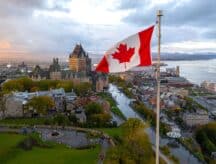Can travellers leave Canada before their 14-day quarantine period?
Travellers to Canada may be allowed to leave before the end of their 14-day quarantine period, but they are required to stay in quarantine until they travel.
Anyone traveling to Canada is required by law to quarantine themselves for a period of 14 days. This includes Canadian citizens and permanent residents, and is in effect as part of a measure to curb the spread of COVID-19.
According to an email sent to CTV News from a representative for the Public Health Agency of Canada (PHAC), travellers may leave before the end of the two weeks if they remain in quarantine until they leave the country.
All travellers are required to have a quarantine plan. This plan must show how they intend to quarantine for 14 days when they arrive in Canada, and must detail how they will obtain essential items such as groceries or medicine during their quarantine period.
Discover your Canadian immigration options
“If they don’t have a plan nor the intention to stay for 14 days, they should not travel to Canada as they may not be allowed to enter the country,” the email said.
Those who exhibit symptoms of COVID-19 may be turned away at the Canadian border, even if they are exempt from Canada’s travel restrictions.
However, this does not apply to Canadian citizens, permanent residents, and persons registered under the Indian Act. According to the PHAC website, they “may enter Canada by right and don’t need an exemption to border restrictions.”
Immediate family members of Canadian citizens and permanent residents who wish to come to Canada and stay less than 15 days must have a non-discretionary reason.
In some cases, the federal government may grant travellers in quarantine limited release for compassionate reasons, such as attending a funeral or a loved one’s final moments. However, these travellers must receive approval for the limited release, before travelling.
For travellers who wish to leave Canada before the end of their 14 day quarantine, but are showing COVID-19 symptoms, they must wait until they are asymptomatic, or hold a medical certificate that shows a negative COVID-19 result.
What does it mean to 'quarantine'?
All travellers to Canada who are granted entry must quarantine for 14 days. Failing to follow this procedure may result in six months in prison, or up to CAD $750,000 in fines.
Travellers must stay in their place of quarantine and self-isolate. They must have a plan to access necessary items, such as groceries, food and medicine, without leaving. They must also not use any common areas. In addition, they are not allowed to welcome guests, even if they stay two metres apart.
Those who are in quarantine may only leave if they had a medical emergency or if they had received pre-approval prior to travelling to Canada.
If travellers live with others, they must have their own bedroom and their own bathroom. They must also have limited interactions with people they live with, keep their distance, and clean common areas after every use. If they intend on having close contact, not wearing a mask and not practicing physical distancing with other members of the household, then other household members must also quarantine.
Discover your Canadian immigration options
© CIC News All Rights Reserved. Visit CanadaVisa.com to discover your Canadian immigration options.
- Do you need Canadian immigration assistance? Contact the Contact Cohen Immigration Law firm by completing our form
- Send us your feedback or your non-legal assistance questions by emailing us at media@canadavisa.com







